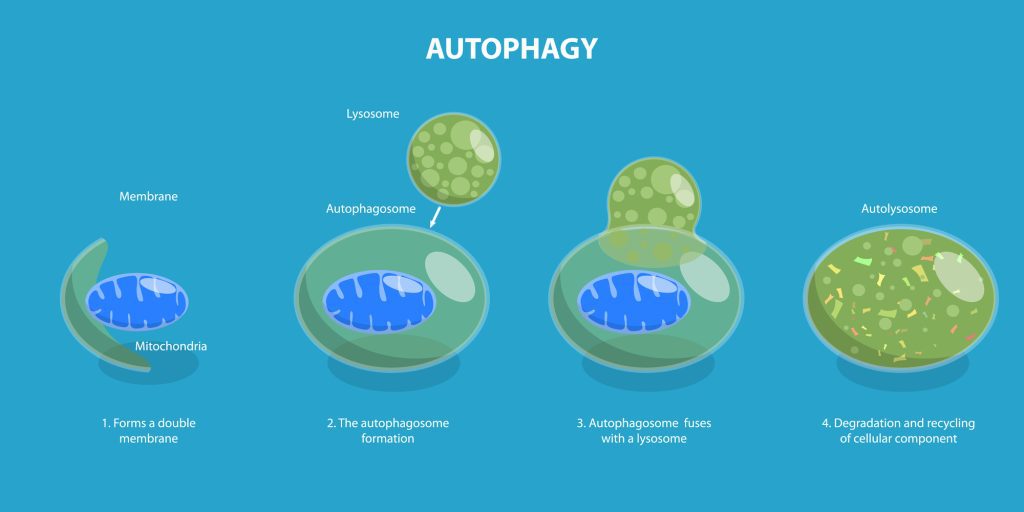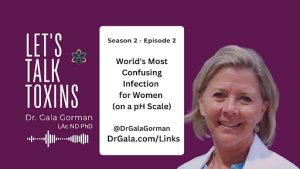If you don’t understand the benefits of fasting, you may think it’s just a way to restrict calories for weight loss. But, for women in midlife it’s far more powerful than that. When you fast, you’re not only shedding pounds. Some types of fasting also trigger a process called autophagy, where your body cleans out damaged cells to regenerate newer, healthier ones.
Now, imagine the kind of impact that could have on your overall health and well-being. Intrigued? Let’s explore this fascinating topic together.
Dr. Gala’s Quick Take
Fasting provides various benefits, like weight loss, improved metabolic health, and reduced inflammation. It can trigger autophagy, a process where your body cleans out damaged cells, and enhances insulin sensitivity making it easier to manage weight and lowering the risk of chronic diseases.
What is intermittent fasting?

Intermittent fasting is an eating pattern that cycles between periods of fasting and eating. It doesn’t dictate what you eat, but when you eat. Imagine harnessing the power of your body’s natural rhythms to optimize your health and manage your weight.
Intermittent fasting will typically lead to weight loss but it also gives you control. It can transform your relationship with food. The most common methods include daily time-restricted eating, alternate-day fasting, and the 5:2 approach. Each offers its own unique advantages, so you can choose the one that fits best with your lifestyle.
Intermittent fasting can also improve insulin sensitivity, reduce inflammation, and enhance your metabolic health. Research even suggests that it may protect against chronic diseases and promote longevity.
Intermittent fasting isn’t a diet. It’s a lifestyle. A lifestyle that champions health, promotes discipline, and rewards with empowerment. It’s a reflection of your strength and resilience. If you’re ready to take control of your health and life, intermittent fasting could be the key.
How does intermittent fasting work?

Intermittent fasting does involve skipping meals; but also activates your body’s natural response to times of less food. When you fast, your body shifts into a mode where it starts using stored fat as its primary source of energy, which leads to weight loss. Additionally, fasting helps lower insulin levels, encouraging your body to enter a state where it burns fat, a state that isn’t usually reached during periods of regular eating.
Another perk of intermittent fasting is giving your digestive system a break, also known as digestive rest. When you pause eating for a while, your entire digestive system gets a good break since it doesn’t have to work. If you extend the rest period, it allows your body to kickstart a process called autophagy—the body’s internal clean-up process.
The advantages go beyond just fat and weight loss. Fasting also increases the production of human growth hormone, which is crucial for a healthy metabolism and muscle growth. It’s like turning on a switch that enhances your body’s natural strength and resilience.
And because fasting promotes cellular repair, clearing out old cells and revitalizing your body from within, every fasting period you engage in is a step toward improved health and vitality.
Fasting Benefits
You might be curious about what intermittent fasting can do for you.
Picture losing extra weight, improving your metabolic health, and boosting your heart’s vitality, all while lessening inflammation and even possibly preventing chronic diseases.
As you can see, many of the benefits of fasting aren’t visible on the outside. Fasting works from the inside out.
This isn’t just a fantasy. It’s the real, tangible and documented benefits of intermittent fasting.

Weight Loss Advantages
The practice of intermittent fasting can open a door to easy weight loss that you may have been struggling to achieve with traditional … or even extreme … diets. This powerful method could be your secret weapon. And it doesn’t require controlling calorie intake to reduce your body weight.
It’s not just about eating less … but eating wisely.
Intermittent fasting doesn’t merely focus on ‘what’ you eat, but more importantly ‘when’ you eat. This approach helps your body tap into its fat storage for energy during fasting periods, boosting your metabolism and naturally promoting weight loss. This approach can be more effective than daily calorie restriction, giving you a sense of control and power over your own body.
In a research study, participants who consumed the same number of calories but restricted their eating window still lost weight … proving that there’s more going on than calorie restriction.
Enhanced Metabolic Health
Intermittent fasting can significantly improve your metabolic health, paving the way for a stronger, leaner, and more vibrant you. This isn’t just about losing a few extra pounds, it’s about tapping into the power within you to fight against insulin resistance, a hidden factor that impairs your metabolic health.
And your metabolic energy system powers your whole body. The healthier it is, the healthier you will be.
The beauty of intermittent fasting is in its ability to reduce your insulin levels, signaling your body to start burning stored fat instead of sugar. And as it stimulates the production of growth hormone, it helps to build muscle and burn fat more efficiently.
It gets even better if you give your body an extended period of digestive rest (it’s thought to be at least 17 to 18 hours). This fasting method not only boosts your metabolic health but also initiates cellular repair processes. Imagine your body conducting maintenance, clearing out waste materials, and rejuvenating itself. This is the potential of intermittent fasting.
Promoting Heart Health
Beyond metabolic health, intermittent fasting also opens up a pathway to improved heart health, offering a range of benefits that could transform your experience of well-being. It’s a simple, yet powerful tool that you can use to strengthen your heart.
Imagine this: Your blood pressure lowers, your triglycerides and cholesterol levels decrease, and your heart beats with renewed vitality. That’s what intermittent fasting can do for you. It’s not just about weight loss; it’s about safeguarding your heart health by reducing the strain on your cardiovascular system.
As intermittent fasting enhances insulin sensitivity, an essential mechanism for protecting your heart and helping you avoid developing metabolic syndrome, you’ll lose weight and feel great. You’ll build a healthier heart.
When intermittent fasting triggers autophagy, your body’s natural clean-up crew, this crucial process removes damaged cells, supporting your heart health and overall vitality.
Reducing Inflammation
Intermittent fasting does more than just enhance your metabolism and aid in weight loss ,,, it also plays a crucial role in reducing inflammation in your body. This effective strategy helps decrease inflammation markers such as C-reactive protein. This is a real game-changer, as high levels of this protein are associated with chronic diseases like heart disease and Alzheimer’s.
But how does this happen? Intermittent fasting works to reduce pro-inflammatory cytokines, creating an overall anti-inflammatory effect. This is no small achievement! It means your body is better equipped to fight off disease with a stronger immune function.
Imagine living life with less pain, more energy, and a robust defense system against diseases. That’s the power of reducing inflammation through intermittent fasting. It’s not just about looking good on the outside, but promoting a healthier, stronger you from the inside.
Disease Risk Reduction
Intermittent fasting is a powerful strategy that can significantly lower your risk of developing chronic diseases. By adopting this lifestyle change, you’re taking charge of your health.
Imagine reducing your risk of type 2 diabetes. Intermittent fasting decreases insulin resistance, reduces oxidative stress and inflammation. All of which are major factors in many health issues.
Achieving better blood pressure and cholesterol levels is also possible through intermittent fasting.
And there’s more. Recent studies suggest that Alzheimer’s disease, a condition that may have seemed unavoidable for some, might actually be preventable. This is the potential of intermittent fasting.
Fasting and Autophagy

Let’s explore how fasting initiates autophagy, a remarkable cellular process that cleans up and rejuvenates your body, keeping it healthy and performing at its best.
When you fast, you’re not just seeing visible signs on the outside like losing weight. You’re also activating autophagy, a series of cellular repair mechanisms. This isn’t idle maintenance; it’s a comprehensive overhaul, a chance for your cells to discard the old and damaged, and make room for the new and robust.
Autophagy is your body’s way of taking out the trash. It removes the damaged components, paving the way for cellular repair and renewal. It jumpstarts renewal from the inside out. Research also suggests that fasting-induced autophagy may help protect against neurodegenerative diseases. It reduces the risks of Alzheimer’s and Parkinson’s. It’s as if you’re defending your brain from the inside, empowering it to resist these debilitating conditions.
Autophagy enhances your immune function, reducing inflammation and improving your body’s resilience. Fasting boosts your health and well-being.

Intermittent Fasting Plans
Whether your goal is weight loss, improved heart health, or reducing the risk of chronic diseases, there’s a fasting schedule that will align with your lifestyle and needs.
Choosing Your Fasting Schedule
The path to better health through intermittent fasting will force you to make some choices. It’s essential to choose a fasting plan that fits your lifestyle and meets your specific health goals. You can select the ideal fasting schedule that works for you.
Let’s take a look at some popular intermittent fasting plans. Daily time-restricted eating, for example, suggests you consume all your meals within a defined 8-hour window. This method works well if you’re searching for a steady, daily routine but it doesn’t stimulate autophagy.
Alternatively, the 5:2 fasting plan involves five days of regular eating and two days of fasting each week. This option provides more flexibility and might be more suitable for those with dynamic, unpredictable schedules, but isn’t likely to produce much weight loss.
Then there’s alternate-day fasting, where you switch between days of normal eating and days of fasting or having a small meal. This plan could be attractive if you’re looking for a more challenging, yet potentially more beneficial, approach.
Fasting for Weight Loss
Starting on your weight loss journey, intermittent fasting plans like daily time-restricted eating with a 6-hour eating window will help you shed those stubborn pounds. This isn’t just a diet, it’s a shift in lifestyle.
With 18 hours of digestive rest, you’ll also stimulate autophagy. So this approach to fasting accumulates benefits.
If you struggle to limit yourself to a 6-hour eating window start with 8 hours. These methods can help you manage weight while improving your metabolic health, moving you closer to your health goals.
Fasting for Metabolic Health
Ready to enhance your metabolic health? Intermittent fasting plans like daily time-restricted eating and 5:2 fasting could be your secret weapon.
By now you understand the weight management benefits of intermittent fasting, but it’s also a powerful tool for improving your metabolic health. By reducing insulin resistance and helping to stabilize blood sugar levels, this practice can elevate your wellness game. Your body will function more efficiently. Fasting intermittently initiates that process.
Imagine waking up each day knowing you’re actively combating metabolic syndrome. This can be your reality with intermittent fasting.

Fasting for Heart Health
Intermittent fasting also paves the way for enhanced heart health. This powerful lifestyle change can lead you to healthier blood pressure, triglycerides, and cholesterol levels … all vital markers of heart health.
Daily time-restricted eating can be effective in promoting heart health. Your body will have the extra energy it needs to function at its best. By enhancing your insulin sensitivity, you’ll be managing your blood sugar levels more efficiently, reducing the risk of cardiovascular diseases.
What’s more, intermittent fasting could lower your inflammation levels, a key factor in the development of heart disease. It’s like turning down the volume on your body’s distress signals, giving your heart a more peaceful environment to operate in.
Integrating intermittent fasting into your lifestyle gives your heart the best protection against heart-related issues. Your heart, your health, and your future self will thank you.
Reducing Chronic Disease Risk
Beyond nurturing your heart health, embracing intermittent fasting can also be a powerful tool in reducing your risk of chronic diseases. In the process, it protects you from the grip of chronic diseases.
Intermittent fasting can help calm the fires of inflammation, a major provocateur of chronic diseases. It’s not magic, but science. By improving biomarkers like blood pressure, cholesterol levels, and insulin sensitivity, you’re demonstrating improved health. It’s a practical strategy that can alter the very course of your health journey.
Key Takeaways
- Fasting improves metabolic health by reducing insulin levels and burning stored fat.
- It aids weight loss by boosting metabolism.
- Intermittent fasting promotes heart health by managing blood pressure and cholesterol levels.
- Fasting activates cellular repair mechanisms, enhancing immune function and the body’s resilience.
- Various fasting schedules known as time-restricted eating can align with individual lifestyle and health goals.
- Fasting effectively enhances metabolic health and aids in weight management.
- Adopting intermittent fasting can lead to significant improvements in cardiovascular health.
- Different fasting methods offer flexibility to suit various personal health and lifestyle needs.
Conclusion
Dive into the world of intermittent fasting. But remember, Rome wasn’t built in a day, and neither is a healthier you.
You’ve got the power to initiate change, to spark your body’s natural healing processes. It’s not just about losing weight, it’s about restoring health.
“If you came into my office, I’d ask you a lot of questions that would help us connect the dots … so that together we can deal with your toxic stress.
Every situation is unique and you need a plan that works for you. Not a one-size-fits-all solution.
If you’re thinking you can’t come into my office, don’t worry. I’ve created a program with all of my initial recommendations to help you unravel the mystery. You can use it at home and at your convenience.
So if you’re thinking that managing chronic stress just isn’t possible … or even the answer … for you, I want to show you what you may be missing.
And how you can identify the toxic stressors that are creating your symptoms with my Human Energy System Reboot. You can get started HERE.” – Dr. Gala













